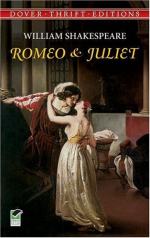|
This section contains 6,534 words (approx. 17 pages at 400 words per page) |

|
[In the following excerpt, three students (A, B, and C), guided by their teacher (Lecturer or Mr. X), debate whether or not Romeo and Juliet adheres to the guidelines of Aristotelian tragedy; that is, in the instructor's words, "does it show the fall of a good and great man, brought about by aglow in his own nature, enforced by Destiny or by the law of Nature, and arousing Pity and Terror, and so bringing about a state of tragic purgation?" Students A and B consider the question in light of scholarly essays by H. B. Charlton, A. C. Bradley, Edward Dowden, Thomas Marc Parrott, Muriel C. Bradbrook, and G. B. Harrison, who generally agree that Romeo and Juliet is not tragic in the Aristotelian sense of the term because the hero is ordinary and the idea of an all-controlling fate is unconvincing. Student C, however, disagrees with...
|
This section contains 6,534 words (approx. 17 pages at 400 words per page) |

|




